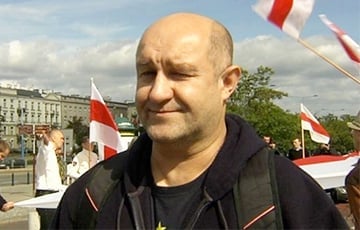‘The Proud Name Of A‘Parasite’
16- 21.02.2025, 21:45
- 29,782

PHOTO: NASHA NIVA
‘The Proud Name Of A‘Parasite’
Will a pot be recognized as extremist materials?
The lack of cognitive abilities or, more simply, brains is the main species characteristic of the Belarusian authorities. Moreover, regardless of the level of access to state secrets, involvement in the decision-making circle and proximity to the main bodies of the country. Dancing with a rake is their favorite pastime, and they compensate for the lack of ideas by periodically returning to what once failed with a loud crash to the laughter of Belarusians.
Exactly eight years have passed since the “March of Outraged Belarusians” took place in Minsk — a mass action against the “parasite decree”. Have those from the offices really forgotten it? Hardly. It was in 2020 that twenty-year-olds took to the streets, who did not remember the events of 2010, because at that time they were learning the multiplication table, and even more so flash-bang grenades in 2006, because then they were sitting on potties or preparing for a kindergarten party. But officials in Belarus — they are still sitting in their chairs, from time to time castling, but not leaving the ranks. After all, they, Belarusian officials, leave the civil service either feet first, or go to prison for bribes. So those who first technically put into effect the “parasite decree”, and then, after a shout from a deathly scared Lukashenka, rewound everything, remember perfectly well how the Belarusians won then, and even without bloodshed. And nevertheless, officials continue to awkwardly dance on a rake shouting “parasites, beware, we are advancing!” Deputy Minister of Labor and Social Protection Valer Kavalkou arrived in the Hrodna Region yesterday and said that the ministry would actively involve “unemployed citizens” in the country's economy, because there is a labor shortage in Belarus. There is no one to work at the enterprises.
Kavalkou, however, does not see cause-and-effect relationships even through a microscope, so he claims that the labor shortage in the country is connected with the fact that the economy is developing rapidly, the country is flourishing and thousands of new jobs are being created every day. Although even a kindergartener, not a schoolchild, understands that the labor shortage in Belarus is a consequence of the mass exodus of citizens to places where they will not be sent to prison.
That is, “parasites” will once again be forced to pay for not being officially employed at factories and plants, or forced to find employment with the help of security forces. Everything is simple here: some GUBOPiK comes and offers a choice — to go to prison or to the machine. But this will only lead to those who are still in Belarus simply leaving. If they are going to work at a machine, then not Lukashenka's one, but somewhere in a free country, where GUBOPiK won't come, where they will pay decently, and the alarm clock will ring for work, not the Ministry of Labor.
By the way, out of curiosity, I looked up where this Valer Kavalkou was in 2017, during the “parasite” protests. It turned out that he was still there and in the same position. In fact, he has been a deputy minister since 2012. So, he remembers 2017 very well. And we remember it too.
Then the “parasite decree” obliged everyone who was not officially employed to pay the state an amount equivalent to 200 dollars annually for this. Lukashenka stated that there were 400 thousand “parasites” in the country. The tax authorities sent out notices to the dead, prisoners, soldiers, and mothers with many children: if the leader said that there were 400 thousand “parasites,” then give them exactly that many receipts to pay the tax. I remember how difficult it was to explain the meaning of this decree to our European colleagues. They sincerely refused to believe it, and they also could not believe the state term “not employed in the economy.” Any more or less educated person understands that any purchase in a store is already participation in the economy. This is what many countries build residency programs for digital nomads on: work remotely, earn money, and pay taxes in another country, and just live and spend your money here, and we will thank you.
So, on February 17, 2017, Belarusians came out to Kastrychnitskaya Square in Minsk. There weren't many familiar faces, by the way: the “March of Outraged Belarusians” was mostly attended by those who had never participated in protests before. They carried posters saying “The main parasite is Lukashenka!” and “No Tax for You!” And then they marched, rattling empty pots, along the avenue to the government house, where they ceremoniously burned notices of the “parasite” tax on the steps.
These were truly successful protests. After the “March of Outraged Belarusians”, protests continued in the regions and districts for a month. People took to the streets, the people whom Lukashenka, no matter how hard he tried, could not call scumbags who had trained in Polish militant camps. And he retreated. The “parasite tax” was abolished. Then they acted quietly, like mice — for example, they charged those who had left for “communal services” in multiple amounts. But they didn't dare to yelp about “parasites”. And they hadn't yet thought of declaring empty pots extremist materials. Or they simply didn't have enough imagination.
Now no one will be surprised if the KGB officers start taking kitchen utensils out of houses after searches, because a pot can become a symbol of protest. However, the level of contempt for the authorities is now such that any object can become a symbol of protest — from a cobblestone to garden shears. Because any Belarusian, taking some utensil in his hands, imagines only one thing: how to destroy ghouls with it. And it turns out that anything can work. After all, we also have a working imagination, and even a creative approach. We just lack the bloodthirstiness to understand what, for example, one pack of salt can do. Or a corkscrew, or a bicycle tire.
Iryna Khalip, exclusively for Charter97.org











